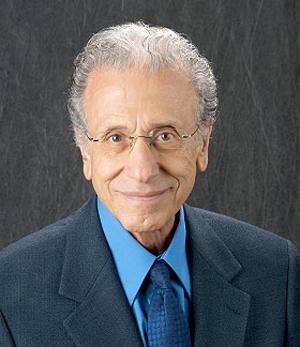
By Celine Klosterman
IOWA CITY — Francois Abboud received the highest award in academic internal medicine April 26, but the University of Iowa professor shines some of the spotlight away from him.
“I’ve always felt many of these awards transcend the individual because awards are to recognize values of a society,” said Dr. Abboud. He belongs to St. Thomas More Parish in Iowa City and recently earned the 2009 George M. Kober Medal from the Association of American Physicians. The award recognizes physicians who are leaders in internal medicine.
“What I’ve done has been in part the work of a team I’ve worked with for decades. The university’s environment helped me be who I am.”
He’s worked at the university nearly 50 years and chaired the department of internal medicine for 26 years. He teaches internal medicine, molecular physiology and biophysics, and is a researcher and clinician. His work has contributed to the understanding and management of cardiovascular disease and stroke, and he pioneered the use of multidisciplinary research teams, the university said.
“Without his contributions, cardiovascular medicine at large and at the UI would not be where it is today,” said Jean Robillard, university vice president for medical affairs.
The opportunity to contribute to the medical field drew Dr. Abboud to the United States from his birthplace of Egypt. There, he’d attended a school run by Christian brothers, and his mother directed a Catholic school for girls.
In 1955, 24-year-old Abboud finished medical school and came to Milwaukee for his residency and fellowship training. Then in 1960, he and his wife, Doris, moved to Iowa City for additional specialty training. There he started working in the laboratory of John Eckstein, a St. Thomas More parishioner who mentored him. “I owe him an awful lot of what I’ve accomplished,” Dr. Abboud said. He joined Eckstein and most of his other Catholic colleagues in going to St. Thomas More Church.
In his work, Dr. Abboud has seen how spirituality can help patients cope. He said he’ll talk with patients about faith and hope — or a specific religion if they bring it up. “There’s a healing element in the way a physician deals with patients and in the way patients have faith to help them overcome adversity.”
He said he’s used faith to deal with “difficult issues” in his own life, though he doesn’t name specifics. “How you interact with people defines you as a person, especially in difficult circumstances,” he said.
Dr. Abboud voiced thanks for the people who’ve supported him, especially his wife. He’s also grateful for his children — three daughters and a son ages 43-52 — who he said have forgiven him for spending most of his time at work.
Achievements take “more than just an individual,” he said.








